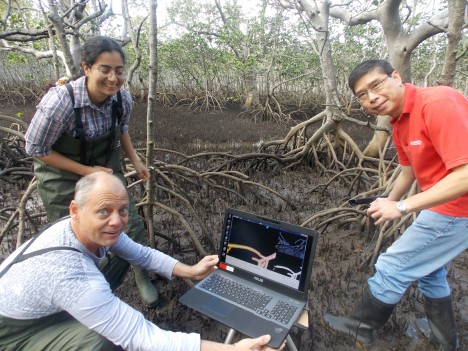A range of external factors have placed an increasing responsibility on water utilities to adopt more sustainable approaches to urban water management, as the era of readily accessible and inexpensive water fades. Covering costs, monitoring non-revenue water and meeting customer demands for equity in billing in the face of rising water prices are some of the core challenges. Recognising that smart metering systems have the potential to revolutionise current utility operations and customer engagement approaches, Associate Professor Rodney Stewart from the Griffith School of Engineering, argues that information systems and associated informatics are the (currently missing) essential ingredients for the successful deployment of smart meters.
To date, roll-outs of smart metering have been driven by the desire to reduce manual readings, increase data on time of use, leakage management, and end-use measurement (like length of shower and toilet flushes, amongst others). In the coming decade, the deployment of smart water metering will transition from being predominantly pilot or trial studies to mainstream citywide implementation. City-wide smart metering implementations have the potential to stream gigabytes of time stamped water use and other associated information (such as water temperature, pressure, quality) from pipe networks right down to the individual water use appliances (e.g. washing machine) and fixtures (e.g. tap). Such datasets are powerful for a range of water planning, engineering and customer response decisions – but only if processed, refined and reported in a way that is more intuitive and informative than traditional approaches.
Advanced metering products presently offered
The terms ‘intelligent’ and ‘smart’ metering are often indiscriminately associated with some combination of technology that is in some way superior to conventional metering. This inherent ambiguity is, however, indicative of the plethora of technological configurations smart metering covers, and its relevance to both the energy and water sectors. For example, automated meter reading (AMR) systems are often sold as smart metering systems, but they merely serve as a better way to collect customer water use data and rarely better inform utility operator or customer functions.
Put simply, a smart metering system should, at a minimum, enable remote reading of water flow (consumption) and other optional data (e.g. water quality, pressure, etc.) at a resolution which improves current operational and customer decision making (e.g. collected in litre increments at least hourly), include accessible and user-friendly data registries of collected data, and autonomously produce readily accessible and useful reports for a range of purposes.
This latter requirement is really the critical component of a smart metering system and many of the current smart meter providers are just offering the advanced metering ‘hardware’ without the critical cloud or edge-based software systems that make collected data useful for water professionals and customers. Moreover, water utilities do not often have the in-house capabilities to build robust data acquisition and informatics algorithms and tools. Essentially, big data alone without effective and efficient data mining methods and informatics algorithms to achieve enhanced decision making is really not that smart at all and will actually bog down water utility operations as they drown in data.
Putting the ‘smart’ into metering
The benefits of smart metering have been declared at many conferences by the growing horde of companies seeking to be the global leader of this burgeoning industry. However, while ‘product’ is ready, many of the potential benefits of smart metering systems have been unfulfilled due to the lack of focus on the necessary data mining and analytics functionality required for re-engineering the way the water utility sector goes about its business. Many of the unfulfilled benefits of smart metering include:
Better city-wide urban water planning
Smart metering enables better understanding of the water consumption patterns of a city’s various residential, commercial and industrial customers and will aid urban water planners to better understand consumption trends and extract greater efficiencies from the present system.
Near real-time water distribution network analysis
Accurate and up-to-date demand data collected at a high resolution is essential to ensure that future mains water supply networks reflect current usage patterns and are designed efficiently from an engineering, environmental and economic perspective.
Targeted water demand management
The prevalent reactionary policies to reduce water demand in supply crisis highlights the need for more detailed information at the “coalface”. The use of smart metering and subsequent datasets could significantly improve decision making in relation to water demand management strategies.
Evidence-based water demand forecasting
Total and disaggregated water consumption data will also allow water businesses to monitor the effect of scarcity pricing or restriction regimes on water consumption in near real-time, and also monitor rebound trends following the removal of these strategies.
Proactive water loss management
A real-time monitoring system would also enable water utilities to intervene as soon as an exception alarm is raised.
Targeted demand efficiency
Regular monitoring of end-use consumption data provides the ability to immediately quantify the effect of targeted water efficiency programs on their intended water end-use(s) (e.g. can instantly establish savings from a washing machine rebate program implemented in a city).
Addressing water-related energy demand
Data from smart water metering systems coupled with energy specifications for water supply products and fixtures (e.g. pumps, water heating systems, etc.) enables unpacking of water-energy nexus implications.
Evidence-based economic assessments
Smart metering and water end-use data provides opportunities for detailed financial analyses on the cost and water saving benefits of implemented water supply programs, ultimately driving a true least cost planning agenda.
Cost reflective urban water tariff reform
Smart meters can also inform the development of different tariff systems (e.g. scarcity pricing) to influence consumption behaviour. While there are many fears related to tariff reform, it potentially has strong advantages for reducing consumption in water scarcity periods, peak network periods, etc., thereby reducing the average cost of water supply for the entire customer base.
Heightened customer satisfaction
The present customer water information and billing arrangements are vastly inadequate. A smart metering system provides the impetus for a new approach to knowledge transfer of water consumption data, directly to consumers via a range of communication platforms and in-house displays.
Coupling smart water meters with informatics
Griffith University has teamed up with industry partners Yarra Valley Water, City West Water, South East Water, Cisco and Aquiba to develop the architecture for some of the critical informatics components of a truly intelligent meter.
This project develops intelligent pattern recognition algorithms using international datasets to autonomously categorise household water consumption data into end uses (e.g. showers, leaks, etc.). Significantly, the project resolves information synthesis concerns by using a hybrid combination of non-linear blind source separation techniques adapted from the pattern recognition, signal processing and decision science fields. Nguyen et al. (2015) provide a complete description of the preliminary system developed.
This project seeks to develop an autonomous and intelligent system for residential water end-use classification, customer feedback and enhanced urban water management that will enhance water businesses and their customers’ understanding of water consumption through providing near real-time reports on when, where and how water is being used in their homes. The prototype smart metering system developed from this project has significant potential for global commercialisation.







Do you expect the data to be sent at the remote meter by GPRS or radio waves?
We are currently developing a SIM card version for possible implementation similar to Britain.
Do you know of such a system in Australia?
We would hate to the invent the wheel.
Our clients are small water authorities.
GR Bush + partners
Hydraulic consulting engineers